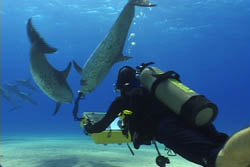Thursday, January 31, 2013
Toxics and Blood Cancer, a Diabetes Link?
This blog was written on the site of the International Myeloma Foundation in response to a posting by the eminent Myeloma authority Dr. Brian Durie.
http://myeloma.org/MtEntryPage.action?source=/imf_blogs/myeloma_voices/2013/01/broad-concerns-about-toxic-exposures-and-myeloma.html
By Hardy Jones
I was diagnosed with Multiple Myeloma in 2003. In 1997 I had been diagnosed with chronic mercury poisoning attributed to a diet high in tuna and swordfish - large predatory fish known to carry high levels of heavy metals and organic pollutants. In 2005 I was tested for organic pollutants such as those derived from agent orange, benzine, DDT, flame retardants etc. I was found to be quite high in some of the congeners. The story is best told in my book, The Voice of the Dolphins, but is also covered on the Bluevoice web site.
I would say (in response to Dr. Durie's intention to test 911 victims) the sooner the better on testing 9/11 victims. Even though it’s slow, POPs (persistent organic pollutants) do break down and diminish. Also, if a person loses weight they will mobilize POPs, which are lipophilic, and excrete them.
When I asked toxics expert Arlene Blum about my POPs levels she said “Oh, too bad you didn’t get tested when you were still eating lots of tuna etc. because your values would now be only a shadow of what they may have been.” I had stopped eating large predatory fish in 1997 after being found to have high mercury levels. My test for POPs was run in 2005.
I’m thinking of having myself tested again - 7 years after the last test but the tests are expensive.
I’ve just heard from a top marine mammal toxicologist that there is likely a correlation between levels of mercury and other heavy metals and POPs. There are confounding problems but as a general rule this analogy works.
I will be getting test results from Peruvian dolphin-eating fishermen by Feb. 21. Our tests for mercury etc. should/could be a proxy for POPs. These fishermen have epidemic incidence of diabetes which Dr. Durie has tied to MM incidence.
Anyway, it's great the IMF is doing this work. Prevention of this disease is better than suppressing it with drugs, even though these drugs have been a godsend to me.
I would be happy to receive information from people who eat a lot of high food chain predatory fish who have MM.
Hardy Jones
hardyjones@bluevoice.org
http://www.bluevoice.org/news_diabetes2.php
http://www.bluevoice.org/news_sharedfate.php
Thursday, January 24, 2013
The Dolphin Knew the Diver Would Help
Reciprocal Altruism
This rather erudite term means one individual helping another with the evolutionary result that the original helper may obtain help in the future and thus better chances of survival and passing along ones genes. Human societies involve a lot of cooperation in everything from agriculture to finance to warfare. So the idea that if I help you, you will help me someday is axiomatic.
But why would a human help a dolphin? At first glance we would have no real expectation that the helped dolphin or others of its group would help us. Perhaps reciprocal altruism may be embedded in our DNA and become trans specific. For an example of a dolphin helping a human, check out this video of dolphins saving me from a hammerhead shark in the Bahamas. http://bluevoice.org/webfilms_dolphinsprotect.php
I’m not saying we help dolphins with the conscious expectation that the dolphin will one day help us in any way. I think we do it because we have an innate sense that having dolphins in the world makes our lives richer. So just by being dolphins are “helping” us.
For an example of humans helping dolphins you have only to look at the worldwide response to he brutal killing of dolphins at Taiji.
For another video of a human helping a dolphin check out http://nydn.us/WoTbUu
Here we have the whole new wrinkle in that the dolphin asked the diver for help. This is not unique but it is mind blowing in what it says about dolphin intelligence and the potential for human-dolphin cooperation in the seas. The dolphin knew the human could help and chanced that he would help.
I started this blog thinking I could wrap it up in 15 minutes. But the idea keeps expanding exponentially, so I’ll stop here and come back to it.
To read a scientific paper by Dr. Ken Norris on reciprocal altruism go to http://bit.ly/W3ffHP
Subscribe to:
Comments (Atom)

